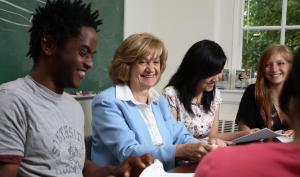
Mary Lou Soffa’s earliest introduction to the burgeoning field of computer science was as an undergraduate intern in information technology at the United States Bureau of Mines in Pittsburgh, where she programmed computers by manually connecting wires.
She was a mathematics student at the University of Pittsburgh because there was no computer science department or degree.
Soffa and computer science have come a long way. As pioneer in the field, she has made an indelible mark through research contributions, her mentorship of students and her emphasis on expanding diversity and inclusion.
“My passions have been producing good research with wonderful Ph.D. students and trying to improve the representation of women in computer science,” said Soffa, Owen R. Cheatham Professor of Sciences and former chair of the Department of Computer Science at the University of Virginia School of Engineering and Applied Science.
After five decades in higher education, Soffa will retire in August of this year, but her legacy will have an impact for years to come at the school, UVA and beyond.
After earning a master’s degree in mathematics from Ohio State University, Soffa explored different fields looking for the right fit, from sociology to environmental acoustics to public health.
“During that time, I took some courses in computer science, and I fell in love with the field,” Soffa said.
In 1977, she earned a doctorate in computer science at Pitt, and subsequently joined the faculty there, where she would spend much of her career.
“It’s been a wonderful field to be in because there have been so many changes and advances,” Soffa said.
She has seen the progression of programming languages and the development of faster and more accurate machinery as well as advancements in artificial intelligence and machine learning.
Soffa has been on the front line of many of those advancements. Her diverse research interests include compilers and programming languages, software and systems engineering. In 2003, she was recognized by the Association for Computing Machinery Special Interest Group on Programming Language, or ACM SIGPLAN, for authoring one of the most influential papers in 20 years related to the design and implementation of programming languages. Her research has informed the performance, reliability and security of software systems.
In 2004, Soffa left Pitt for the University of Virginia to take on the role of department chair, occupying that post through 2012. During her time as chair, she made significant changes at UVA that are still in place today.
“One of the first things Mary Lou did as chair was initiate the effort to create a computer science major for students in the College of Arts and Sciences. She was instrumental in launching the interdisciplinary Bachelor of Arts in Computer Science degree in 2006,” said David Evans, professor of computer science, who chaired the committee to create the degree and served as its first director.
“During her time as chair, the major grew quickly from just a few students in the first year to become the most popular major offered by a department in the School of Engineering and Applied Science.”
During her second term as chair, Soffa faced several challenges brought on by the Great Recession, including hiring freezes, salary freezes and cuts to department funds, said Kevin Skadron, the Harry Douglas Forsyth Professor of Computer Science, who succeeded her as chair.
“She did a really wonderful job of shielding the faculty from this and minimizing our need to worry about it,” Skadron said. “She did everything in her power to help junior faculty succeed. When I became chair, one of my first realizations was how much of an umbrella she had been. She persuaded me to be a candidate for that position. In my first year as chair, she was a mentor to me, helping me find my footing.”
Soffa hasn’t just mentored her up-and-coming colleagues, she has been an unwavering advocate for students. She has directed 32 Ph.D. students to completion, half of whom are women.
“All of my students have been the highlights of my career,” Soffa said. “I’ve wanted to guide students so that they feel successful and confident. My students have gone on to produce excellent research in academia and industry. I’ve been very proud of their accomplishments.”
Among them was Tanima Dey, who earned her Ph.D. from UVA in 2013 and is now a senior software engineer at Intel.
“Dr. Soffa has been a role model as a researcher, academic, advisor and mentor (the list can be quite endless),” Dey said in an email. “When I just started graduate school and did not know much about research, she nurtured and taught me how to think and tackle a research problem.”
Soffa’s mentorship still informs how Dey approaches her professional career.
“Given a very competitive research topic at that time, the journey was not an easy one, but certainly was a successful one because Dr. Soffa made sure I pushed the boundaries and was motivated to work hard to achieve my goals,” Dey said.
“I continue my professional work in that light, pushing the limit to do my best work and keep the ‘fire in the belly’ she ignited. I am forever grateful to Dr. Soffa as she played a big part in who I am today.”
